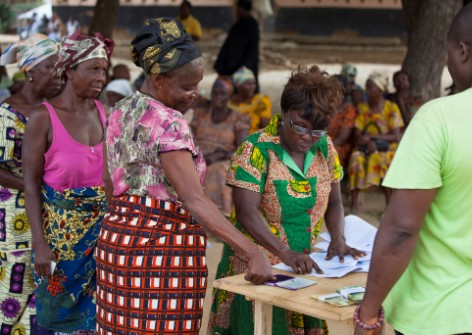SEND Ghana, an advocacy organisation has called on government to expand the coverage of the Livelihood Empowerment Against Poverty (LEAP) programme to all eligible extremely poor persons to address plights of the many vulnerable.
It also called for the expansion of the Ghana School Feeding Programme to capture all eligible schools that were currently not on the programme to boost school enrollment.
A statement issued and signed by Mr George Osei-Akoto Bimpeh, Country Director, SEND Ghana, to mark the 2020 International Day for the Eradication of Poverty and copied to the Ghana News Agency said the programme currently covered only 1, 650, 000 out of about 2.4 million extremely poor persons in the country.
It further explained that the grant offered under the programme was inadequate in meeting the needs and nutritional requirements of enrolled households, adding that government must increase the grants to address these shortcomings.
"We, specifically, demand from the government to expand coverage of LEAP to all eligible extremely poor persons and increase the cash amount by 100 per cent. This could be done by a regular grant review process such that amounts are adjusted regularly in line with prevailing inflation rates to ensure that the purchasing power of beneficiaries is not eroded," the statement explained.
The World Bank estimates that an additional 88 million to 115 million people could be pushed into extreme poverty this year, with the total rising to as many as 150 million by 2021 due to the Covid-19 pandemic.
In Ghana, poverty levels have witnessed a considerable decline in the past two decades with the number of poor having declined from 7.9 million in 1992 (56.5%) to 6.3 million (29%) in 2006 and 24.2% by 2013.
"This indicates that between 1992 and 2013, national poverty fell by more than half," the statement said.
It added that however, the decline in the poverty headcount between 2013 and 2017 was just 0.8 per cent, that is, from 24.2 per cent to 23 4 per cent, while the number of people living in extreme poverty has unacceptably increased from 2.2 million to 2.4 million during the same period.
The most recent Multidimensional Poverty Index (MPI) reveals that Ghana's incidence of multidimensional poverty is 45.6 per cent.
This means that at least 2 out of every 5 Ghanaians are identified as multi-dimensionally poor. The statement noted that there was evidence of persistent social, economic, geographic, and gender inequality, while poverty was widespread in many areas of the country.
"The United Nations Special Rapporteur on extreme poverty and human rights Professor Philip Alston in April 2018 cautioned that Ghana is likely to fall short of meeting the Sustainable Development Goals (SDGs), especially the eradication of poverty if it fails to tackle the inequality problem in the country.
"He further noted that "the benefits of record levels of economic growth experienced over the past decade had gone overwhelmingly to the wealthy, and inequality is higher than it has ever been in Ghana," the statement said.
The statement said the gap between urban and rural areas had also doubled due to a drop in urban poverty in recent years with Rural poverty now almost 4 times as high as urban poverty compared to the 1990s when it was only twice as high.
"In the decade ending in 2016, the country saw 1,000 new US dollar millionaires created, but only 60 of these were women," it noted.
The statement, among other things, also called for expedited action in the completion of the Ghana National Household Registry to ensure that extremely poor households are targeted for complementary services on Social Protection, expansion of the NHIS benefit package to cover clinical tests for women and girls such as cervical and breast cancer tests and establish dedicated sources of funding for Social Protection programmes and provision of funding for the holistic implementation of the Inclusive Education policy to cater for the educational needs of street children.
The International Day for Eradication of Poverty is marked on October 17 annually.
Latest Stories
-
Absa Bank Ghana hosts Youth Festival to empower young entrepreneurs
2 minutes -
WPRD Festival 2025 closes with PR fireside chat on leadership
10 minutes -
Afrofuture and WatsUp TV launch nationwide Rising Star Challenge on university campuses
19 minutes -
Auditor-General report: Heads must roll among technical officers, not just politicians – Dr. Eric Oduro Osae
26 minutes -
Ghana must rethink internal audit to defeat corruption
29 minutes -
CIMG engages BoG to deepen collaborations
34 minutes -
Hey big spenders – Liverpool lead top-four domination of £1bn deals
37 minutes -
UK-Ghana industrial ties celebrated as British High Commissioner visits Springs and Bolts factory
50 minutes -
Discontinuation of UniBank case: Adongo calls for national discourse
51 minutes -
uniBank case: The decision creates avenue to loot – Kwadwo Poku criticises AG’s move to drop Duffuor case
57 minutes -
US diplomats asked if non-whites qualify for Trump refugee program for South Africans
1 hour -
Medikal set to headline WatsUp On Campus this Saturday at Cape Coast Technical University
1 hour -
It appears Dr. Duffuor was being used as a scapegoat – Kofi Abotsi
2 hours -
FA set to deliver Paqueta verdict
2 hours -
Messi ‘upset’ over ban for skipping MLS All-Star game
2 hours

